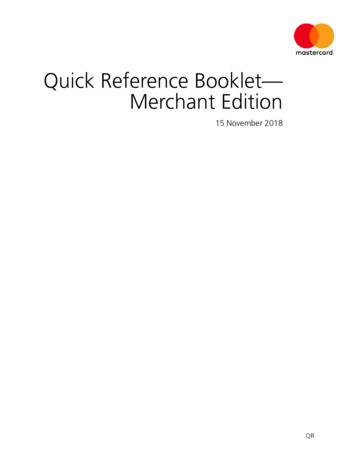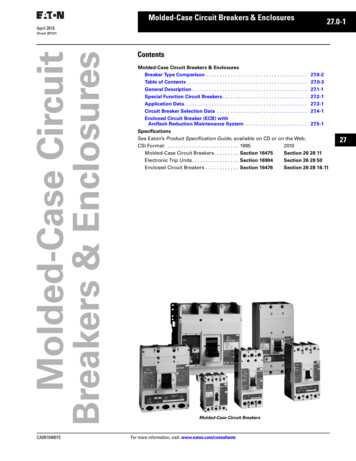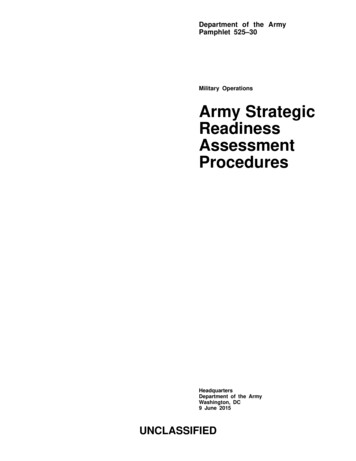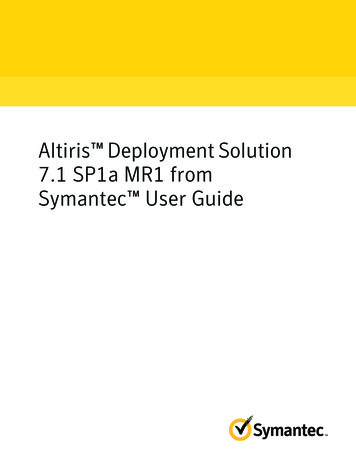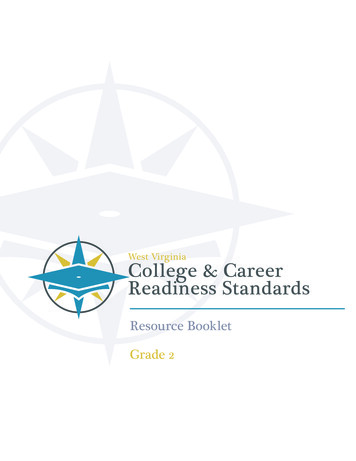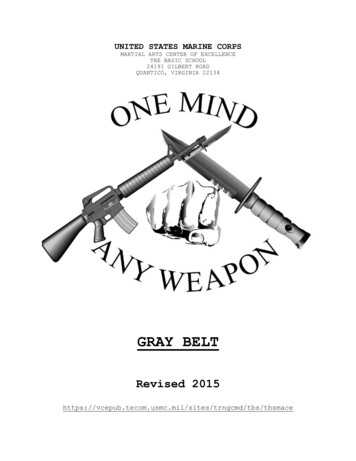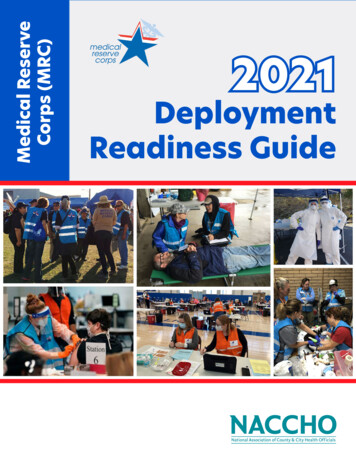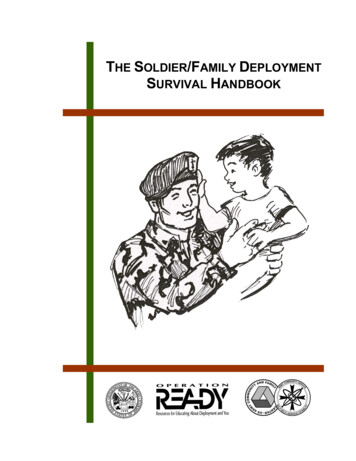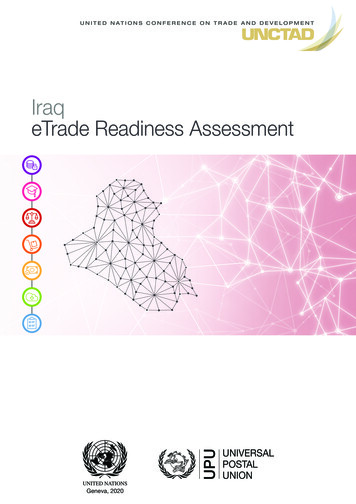
Transcription
PRE-DEPLOYMENTHANDBOOKReadiness & DeploymentHandbook“Always Ready”i
SECTION 1 - INTRODUCTION1WHAT IS A DEPLOYMENT? . 1SECTION 2 - IMPORTANT DOCUMENTS & INFORMATION3RECORD OF EMERGENCY DATA (RED). 3FAMILY CARE PLAN (FCP) . 3MILITARY IDENTIFICATION CARDS . 4WILLS. 5POWERS OF ATTORNEY. 5VOTING. 5DEPLOYMENT CHECKLISTS . 5EMERGENCY PREPAREDNESS . 6VACCINATIONS . 6OVERSEAS TRAVEL . 6SPACE “A” TRAVEL . 7SECTION 3 - BENEFITS AND ENTITLEMENTS8MEDICAL. 8PAY ENTITLEMENTS AND FINANCES . 10BILL PAYING . 11CREDIT . 12TAXES . 13SERVICEMEMBERS’ GROUP LIFE INSURANCE (SGLI) . 14SERVICEMEMBERS’ GROUP LIFE INSURANCE TRAUMATIC INJURY PROTECTIONPROGRAM (TSGLI) . 14SERVICEMEMBERS CIVIL RELIEF ACT (SCRA) . 15SECTION 4 - PROPERTY MANAGEMENT16GENERAL PROPERTY MANAGEMENT . 16BARRACKS . 17NON-BARRACKS LIVING ARRANGEMENTS. 17BASE HOUSING . 17VEHICLES . 17CELLULAR PHONE . 18ii Pre-deployment Handbook 2017 – Table of Contents
SECTION 5 - PREPARING YOURSELF & LOVED ONES19MARINES STAYING POSITIVE . 19COMMON DEPLOYMENT ISSUES . 20EXPECTATIONS AND PERSONAL GOALS. 20SECTION 6 - COMMUNICATION22OPERATION SECURITY AND SOCIAL NETWORKING SITES . 22COMMUNICATION THROUGHOUT THE DEPLOYMENT . 23PERSONAL COMMUNICATION. 23EMAIL . 23LETTERS . 24TELEPHONE CALLS . 24PICTURES & VIDEO TELECONFERENCING . 24OFFICIAL COMMAND COMMUNICATION . 25EMERGENCY NOTIFICATIONS . 25EMERGENCY COMMUNICATION FROM HOME . 26SECTION 7 - CHILDREN AND DEPLOYMENT28CHILD AND YOUTH PROGRAMS . 29SECTION 8 - MCCS AND OTHER OPPORTUNITIES30HIGHER EDUCATION FOR MARINES AND SPOUSES . 31SERVICEMEMBERS OPPORTUNITY COLLEGES DEGREE NETWORK SYSTEM(SOCDNS). 31SPOUSE EDUCATION AND CAREER OPPORTUNITIES (SECO) . 31FAMILY MEMBER EMPLOYMENT ASSISTANCE PROGRAM (FMEAP) . 31VOLUNTEER OPPORTUNITIES FOR THE SPOUSE & PARENTS OF MARINES. 31SECTION 9 - RESOURCES33AMERICAN RED CROSS (ARC). 33CHILD CARE AWARE OF AMERICA (CCAOA) . 33DEFENSE CENTERS FOR EXCELLENCE. 33DEFENSE FINANCE ACCOUNTING SERVICE (DFAS). 34EXCEPTIONAL FAMILY MEMBER PROGRAM (EFMP) . 34FAMILY READINESS OFFICER (FRO) . 34Pre-deployment Handbook 2017 – Table of Contents iii
FAMILIES OVERCOMING UNDER STRESS (FOCUS) . 34INSTALLATION PERSONNEL ADMINISTRATION CENTER (IPAC) . 34LEGAL SERVICES. 35MARINE CORPS COMMUNITY SERVICES (MCCS) . 35MARINE AND FAMILY (MF) . 35MARINE EDUCATION PROGRAM. 35MILITARY ONESOURCE . 36NAVY-MARINE CORPS RELIEF SOCIETY (NMCRS) . 36PERSONAL FINANCIAL MANAGEMENT PROGRAM (PFM) . 37SEMPER FIT & RECREATION. 37SINGLE MARINE PROGRAM (SMP) . 37UNITED SERVICE ORGANIZATIONS (USO) . 38USEFUL WEBSITES . 38CHILDREN’S HELPFUL WEBSITES AND RESOURCES . 39COUNSELING SUPPORT RESOURCES . 40SECTION 10 - RESERVIST INFORMATION42EMPLOYER SUPPORT OF THE GUARD AND RESERVE (ESGR) . 44UNIFORMED SERVICES EMPLOYMENT AND REEMPLOYMENT RIGHTSACT (USERRA) . 45CHILDCARE FOR RESERVE FAMILIES . 45HANDBOOK ACRONYMS . 46iv Pre-deployment Handbook 2017 – Table of Contents
SECTION 1 -INTRODUCTIONSection 1INTRODUCTIONWhat is a Deployment?Deployment is loosely defined as the movement of an individual or entire military unit to another location toaccomplish a task or mission. The mission may be a routine training exercise, humanitarian assistance or acombat operation. Another type of deployment, although not considered a true deployment by many, is specialassignments such as Temporary Additional Duty (TAD). TAD can take Marines away from their families forextended periods of time even if not conducting the above referenced activities.Type of Deployment*Average TimeCombat DeploymentTime variesIndividual Augment (IA)Up to 1 yearMarine Air-Ground Task Force(MAGTF)Up to 6 months (Mission dependent)Marine Expeditionary Brigade (MEB)Up to 30 daysMarine Expeditionary Unit (MEU)6 monthsUnit Deployment Program (UDP)6 months*Times will vary depending on the mission Combat Deployment is the movement of military personnel and equipment located in declared hostilezones, which require continuous alert from potential attacks from adversaries.Page 1
Individual Augmentee (IA) is a United States military member assigned to a unit (battalion orcompany) as a temporary duty assignment (TAD/TDY). Individual Augmentees can be used to fillshortages or can be used when an individual with specialized knowledge or skill sets is required. It canalso include members from an entirely different branch of service. Marine Air-Ground Task Force (MAGTF) is a balanced air-ground, combined arms task organizationof Marine Corps forces under a single commander that is structured to accomplish a specific mission. AMAGTF with separate air ground headquarters is normally formed for combat operations and trainingexercises in which substantial combat forces of both Marine aviation and Marine ground units areincluded in the task organization of participating Marine forces. Marine Expeditionary Brigade (MEB) is a formation of a Marine Air-Ground Task Force that istasked to meet the requirements of a specific situation. Marine Expeditionary Unit (MEU) is an expeditionary quick reaction force, deployed and ready forimmediate response to any crisis, whether it is a natural disaster or a combat related mission. The MEUis unique in that its air and ground combat elements are combined with a logistics combat element underone commander; other services do not unite the command of air and ground forces until much highercommand levels. Unit Deployment Program (UDP) is a system for assigning deployments of the United States MarineCorps. The intent is to reduce the number of unaccompanied tours and improve unit continuity. TheCommandant of the Marine Corps, (CMC) established it to provide for the deployment of units to theWestern Pacific (WESTPAC) for periods of approximately six months. The initial program was a sixphased evolution that sequenced infantry battalions and aircraft squadrons/detachments into WESTPACdeployments, thus eliminating the 12-month permanent change of station assignments for personnelassigned to these units.Preparation is essential for a successful deployment. If this is your first deployment, this handbook will assistyou and your Marine as you prepare for your upcoming deployment. If you have experienced previousdeployments, reviewing this handbook will serve as a reminder. The Marine Corps prides itself in alwaysbeing ready, and all Marines and families should be prepared for any future deployments to minimize anyunnecessary disruptions. This allows the Marine and his/her family to always be prepared for the unknown,thereby increasing mission readiness.2 Pre-deployment Handbook 2017 – Introduction
SECTION 2 IMPORTANTDOCUMENTS &INFORMATIONSection 2Important Documents & InformationMission readiness is essential to allow Marines to make fast moves. Regardless of the deployment,Marines and families should have all their documents current prior to departure.Record of Emergency Data (RED)The Record of Emergency Data form is commonly referred to as the RED in the Marine’s servicerecord. The RED lists the following: Who should be contacted in an emergency, (i.e., illness, injury, fatality, or if the Marine goesmissing.) Any time your family moves or contact information changes. Correct designees for notification, pay arrears, death gratuity, and person authorized to directdisposition (PADD). Updated beneficiary and contact information. (Please note, Servicemembers’ Group LifeInsurance (SGLI) cannot be updated through the RED, but it is important that the correctbeneficiary and contact information is included.)Family Care Plan (FCP)A Family Care Plan (FCP) is a document that outlines the financial, medical, legal, logistical,educational, monetary, and religious arrangements for the care of a Marine’s family members. The planmust include all reasonably foreseeable situations and be detailed enough to provide for a smooth, rapidtransfer of responsibility to the named caregiver upon the absence of the Marine(s). The plan should be3
specific to the needs of each family situation. It is required that all Marines except for those withoutdependent(s) maintain a current Family Care Plan and update it annually or anytime there is a change intheir dependent status.Marine Corps Order 1740.13C requires the following individuals to have a Family Care Plan: A Marine who is, or becomes, a single parent. Dual military couples with dependents (both members need to have a Family Care Plan). Marines who have sole responsibility for the care of children under the age of 19. Marines with family members who are unable to care for themselves in the Marine’s absence(this includes elderly parents).The Base Legal Services Office can assist with the required legal documents, including preparation ofyour FCP. Additionally, Marine Corps Family Team Building (MCFTB) offers a Family Care Planworkshop. Please check your local installation MCFTB office for the next available class. Once yourFCP is complete, ensure that your command receives the original in a sealed envelope. . The originalcopy is maintained within your unit, normally at the Admin office, and would only be opened whendirected by the Commanding Officer of the unit, if deemed necessary or in case of an emergency. Seethe checklist for single parent Marines in this handbook to help you make plans for minor children.Please also ensure that you and a trusted family member have a copy of your FCP.In addition, DoD Instruction 1342.19, Family Care Plans, was revised March 25, 2013 to require plansfrom troops and expeditionary civilians who have legal custody or joint custody of a minor child. Thepolicy requires parents to obtain the consent of the noncustodial or adoptive parent to any family careplan that would leave the child in the custody of a third party. The policy is focused on ensuring thenoncustodial biological parent is contacted and that arrangements are discussed with that person.Family care plans do not allow you to transfer temporary custody to your child’s stepparent orgrandparent during a deployment if there is a non-custodial parent who can care for that dependent orchild.Military Identification CardsMilitary identification cards enable access to military services such as medical, recreation, housing,family support, and even access to the base. Ensure everyone’s ID card is current and will not expireduring the deployment, including those dependents that do not live with you. Update ID cards at theinstallation Defense Enrollment Eligibility Reporting System (DEERS), Real-time Automated PersonnelIdentification System (RAPIDS) office.If your ID expires during deployment, spouses can renew their ID cards by: Sponsor gives dependent General Power of Attorney and dependent presents original GeneralPOA at time of service. The General POA must be original, valid, and unexpired. Sponsor can digitally sign DD Form 1172-2 with CAC using RAPIDS Self-Service (RSS):https://www.dmdc.osd.mil/self service/. DoD Common Access Card (CAC) holders may accesstheir DEERS record to make changes, perform CAC updates (e.g., add or change emailcertificates), or sign the DD Form 1172-2 (1/2014) using RAPIDS Self-Service (RSS):https://www.dmdc.osd.mil/self service/. The dependent brings copy to center for service.4 Pre-deployment Handbook 2017 – Important Documents & Information
Sponsor completes DD Form 1172-2 and signature is notarized, dependent presents original forservice.Note: Once signed, the DD Form 1172-2 is valid for 90 calendar days and can only be used for oneservice visit. Only the dependents listed on the DD Form 1172-2 can receive service as authorizedby sponsor.WillsA will, also known as a Last Will and Testament, is a legal expression or declaration of an individual’swishes upon his or her death. To ensure your estate is distributed the way you want, make sure you havea current will and your loved ones know its location. For those with children, it is important to includewho you would want to care for your children should something happen to both parents. Your localBase Legal Services Office will assist you in making a will at no cost. Reminder: Provide a copy tothe Executor of your will. The legal office does not maintain copies of wills.Powers of AttorneyPowers of attorney can be very useful when conducting personal business. They can also be used withextreme caution, as they allow someone to act on your behalf. You may need different types of powersof attorney for different purposes. For example, you may need a special power of attorney to file yourtaxes or to buy or sell a big-ticket item such as a vehicle or a home. It is best to consult with your BaseLegal Services Office to discuss options and draw up a power of attorney at no charge.Active-duty single parents or dual military couples should obtain a special power of attorney for theirchild/children’s caregiver. The term “in loco parentis” refers to an individual who assumes parentalstatus and responsibilities for another individual without formal adoption procedures. The execution ofthis role is through a special power of attorney. This special power of attorney allows a person youappoint to make decisions regarding your child/children on your behalf such as enrollment in school,sports or other activities, and consent to all medical and dental care and treatment necessary andappropriate for the general health and welfare of the child/children. The Health Insurance Portabilityand Accountability Act (HIPAA) limits who may access medical records, so a medical power ofattorney may also be needed. This document allows an individual to appoint someone else to makedecisions about a dependent’s health care. This type of advance directive may also be called a healthcare proxy, durable power of attorney for health care, or appointment of a health care agent. The personappointed may be called a health care agent, surrogate, attorney-in-fact, or proxy.VotingRegardless of where you are in the world, you should have the ability to vote. Contact your unit votingassistance officer to complete a federal post card application to register to vote. Ensure you use yourdeployment address when you complete the application to ensure your absentee ballot gets to you intime.Deployment ChecklistsPlease note that the checklists in Chapter 11 are intended to assist you in preparing and achievingpersonal and family readiness for deployment. Please use the checklists as a guide and reference pointfor your preparations and add additional items as applicable for your personal situation. Although notall items will apply to each individual, the idea is to start thinking about the necessary preparationsPre-deployment Handbook 2017 – Important Documents & Information 5
needed to contribute to a smoother deployment and avoiding as many possible obstacles as possible. Inaddition, a personal preparation checklist is included to contribute to Marines maximizing their unit andmission readiness. It also offers ideas for personal items that are often desired after Marines arrive attheir deployment location. Service Members should refer to their S-3 office to obtain a packing list perthe deployment location.Emergency PreparednessThe Marine Corps encourages all personnel to maintain a basic level of preparedness for all potentialhazards. Preventing loss of life and minimizing property damage are responsibilities shared by all. It isimportant that Marine Corps families prepare themselves for all types of emergencies to increase theirpersonal sense of security and peace of mind. Get informed about your area’s potential natural andmanmade hazards, create and have a family emergency plan, make an emergency supply kit, prepareyour children by discussing potential hazards, and protect your personal property. Additionally, ensurethat your Family Readiness Officer knows how and where to contact you or your family in case of anemergency.MCFTB provides an Emergency Preparedness and Safe & Sound at home workshop, which entailsinformation specific to your area. Also included in the workshop are evacuation procedures andentitlements in the event of a mandatory evacuation.VaccinationsThe International Health Regulations adopted by the World Health Organization stipulate thatvaccinations against smallpox, cholera, and yellow fever may be required as a condition of entry into acountry. Required vaccination requirements are listed at: wwwnc.cdc.gov/travel/destinations/list.aspx.Upon receipt of your web orders, it is the Marine’s responsibility to call the Naval Medical Clinic inorder to start the overseas medical screening process. The suitability screening coordinators will assistthe Marine and will provide all necessary documentation needed to complete their screening.Overseas TravelFamily members planning to travel while their Marine is deployed must ensure all documents arecurrent to make border crossings easier. If you do not have passports for the children, it isrecommended that you obtain them prior to your Marine’s deployment. In case of an emergency withyour Marine, the spouse and parents of the Marine should have a passport readily available in caseemergency travel to the Marine is required.Passports will be necessary if planning to take leave or to travel overseas not on deployment orders. Itusually takes several weeks to process a passport. For information, go to http://travel.state.gov/passport.Visas are required to enter many countries. Go to http://www.state.gov/travel to learn specificrequirements for the country or countries you plan to visit.6 Pre-deployment Handbook 2017 – Important Documents & Information
Space “A” TravelFree Space “A” Flights for Families of DeployedSpouses and children of personnel deployed 120 days or longer can use military transport in CONUS; toand from CONUS; and within and between overseas locations provided they have a verification letterfrom the Service Member’s Commander. Family members, regardless of where they are based, maytravel unaccompanied for unlimited times during the deployment when seats are available. Childrenunder the age of 18 need an eligible parent or legal guardian to travel with them.Space available travel is a privilege in which Service Members and their families, when space isavailable, are transported on vessels operated by any military transport agency of the Department ofDefense. Space available travel is defined as "travel aboard DoD owned or controlled aircraft andoccurs when aircrafts are not fully booked with passengers traveling under orders."The travel option is also available to Guard, Reserve and Retired families, as well as Marine familieswhose military sponsor is assigned to a deployed ship with PCS orders. While many may use theprivilege to visit parents and grandparents, the guidelines do not restrict travel to home of record orfamily-based visits.Reminder to All Space-A Travelers: Per DODI 4515.13, Section 4, Paragraph 4.1.a., Reservations.There is no guarantee of transportation and reservations will not be accepted or made for any spaceavailable traveler. The DoD is not obligated to continue an individual's travel or return the individual tothe point of origin or any other point. Travelers should have sufficient personal funds to pay forcommercial transportation, lodging, and other expenses if space-available transportation is not available.All associated expenses are the responsibility of the traveler.For specific travel information, please contact your nearest AMC Terminal or -deployment Handbook 2017 – Important Documents & Information 7
SECTION 3 BENEFITS ANDENTITLEMENTSSection 3Benefits and EntitlementsMedicalTRICARE is the health care program for Marines and their families. Reservists and National Guardmembers are also eligible for TRICARE coverage when they are on active duty, pre- and postmobilization.Common TRICARE programs are: TRICARE Prime: A managed-care option a civilian HMO (health maintenance organization).TRICARE Prime requires enrollment. TRICARE Extra: Goes into effect whenever a standard beneficiary chooses to make anappointment with a TRICARE network provider. TRICARE Extra does not require enrollment. TRICARE Standard: The basic TRICARE health care program, offering comprehensivecoverage for beneficiaries (not to include active-duty members) not enrolled in TRICARE Prime.TRICARE Standard does not require enrollment. TRICARE Reserve Select: A premium-based, worldwide health plan that qualified NationalGuard and Reserve members may purchase. The TRICARE Young Adult (TYA): A premium-based health care plan available for purchaseby qualified dependents. TYA offers TRICARE Prime and TRICARE Standard coverageworldwide. TYA includes medical and pharmacy benefits, but excludes dental coverage.Health benefits advisors are available at local TRICARE Service Centers (TSC) or military treatmentfacilities (MTF) to help with questions regarding health care services, go to: http://www.tricare.mil/.8 Pre-deployment Handbook 2017 – Benefits and Entitlements
Marines are required to enroll in TRICARE Prime. Enrollment is not automatic. Verify that you areenrolled prior to your departure. You should already have a DNA sample on file from your final trip toMilitary Entrance Processing Station (MEPS) upon completion of basic training.DentalDental treatment is free to all active-duty Marines with the exception of cosmetic work that is notdeemed necessary.TRICARE dental program through MetLife is a voluntary dental plan available to family members of allactive duty and active Guard/Reserve personnel. This program offers comprehensive benefits withpremiums that are separate from TRICARE and is available worldwide. There are two levels ofenrollment; single coverage is for sponsors with only one eligible family member, and family coverageis for sponsors with more than one eligible family member.Information and enrollment forms can be obtained: By calling MetLife at (855) 638-8371 Online at https://employeedental.metlife.com At your TRICARE Service Center (if available) At the military dental treatment facilityPre-deployment Handbook 2017 – Benefits and Entitlements 9
Pay Entitlements and FinancesIt is essential to create and discuss your spending plan or budget prior to deployment. Page 20 providesa list of financial consideration to help you build your spending plan or budget. Contact your localMCCS Personal Finance Management Program for help developing a spending plan. You may alsocontact Navy-Marine Corps Relief Society, Credit Union, or Military OneSource to schedule anappointment.Pay changes during a deployment may include: Sea pay Family separation allowance Combat duty, Hostile Fire, or Imminent Danger pay Pay increases with promotions Re-enlistment bonuses Being deployed to a tax-exempt location Basic Allowance for Subsistence (BAS)Additional expenses for family members may include: Child care Home and lawn maintenance Car repairs Care packages and postage Recreation Travel to visit familyDo not forget to plan for periodic expenses that do not occur monthly, such as: Insurance premiums Car maintenance Home maintenance Holiday gifts Tax payments Tuition Unexpected medical expenses Car registrationIt is common to want to do some recreational shopping when lonely or feeling down; however, makesure that you have allotted money in your budget for such shopping excursions. Buying gifts for family,10 Pre-deployment Handbook 2017 – Benefits and Entitlements
friends, and sweethearts can get expensive. Your loved one may appreciate letters, CDs, photos, etc.more, and the cost is minimal.Many report that one of the advantages of an extended deployment is that it provides an opportunity tosave money. Allowances should be made for some recreation to allow everyone a break, both for theMarine on deployment and the family members back home.Everyone needs funding for emergencies. If married, consider signing a pre-authorization form withNavy-Marine Corps Relief Society (NMCRS) if savings are m
ii Pre-deployment Handbook 2017 - Table of Contents SECTION 1 - INTRODUCTION 1 WHAT IS A DEPLOYMENT?. 1
